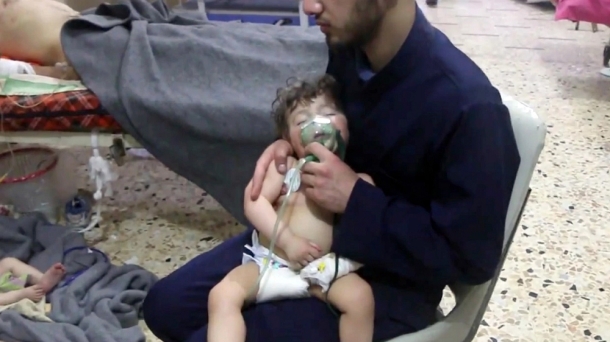
The recent ground assault in eastern Ghouta western Syria is one of the military actions taken by the Assad regime against the local population, and reveals a continuous campaign of cleansing the Damascus area from the proponents of the Syrian
The fierce assault on the area on 18 February 2018, which defies the United Nations resolution and the Security-Council brokered 30-day humanitarian truce, showcases another episode in a long series of reoccurring attacks. They have been supported by the Russian air forces; and have led to major destruction and the death of hundreds of civilians.
Despite the Security Council’s efforts to stop the bloodshed in Syria, Assad’s forces were able to penetrate in the exposed agricultural land under the Russian air cover, and to widen the demarcation line between Jaysh-al-Islam in eastern part of Ghouta and Al-Rahman Corps in the western part in the three-week long campaign.
However, the recent attack has not been the only ground assault to have occurred in this area. In the five-year long siege of Syria, the regime forces have committed various violations against civilians. The bombing of the area with sarin gas in August 2013 - that killed 1429 civilians- the deliberate starvation policies, the prevention of medical aid delivery, and the indiscriminate shelling of schools and hospitals are just a few examples of the atrocities committed against the Syrian population.
The survival rate of the local civilians remains alarming. Only one fifth of Ghouta’s initial population of 2 million has survived; most of them live in the caves and shelters of Mashhad. The Syrian regime has ignored all four UN resolutions that have cautioned against the worsening situation in Ghouta. Resolution 2118 has called for the ban of the use of chemical weapons in combat. However, the very chemical weapons have been used, once again, against the residents of the rebel-held town of Douma April 7. All Syrian UN resolutions have called directly on the Syrian regime to lift the siege on civilians and allow the humanitarian aid and food supply convoys to reach the besieged areas without conditions.
Ghouta has always played a significant strategic role in the fight against tyrannical authorities. Historical accounts point to the fierce resistance of the locals against the French occupation in 1925. The Ghoutains have maintained their fame for their moral conviction of standing to power and defying tyrannical politics. By the end of 2012, the area around Damascus was one of the most important strongholds of the Syrian revolution. It has showed an exceptional drive for opposition and defiance of power while being located in the proximity of the Presidential Place where the Assad family has ruled Syria for the last forty years. The Syrian regime has long isolated Damascus from its geographical and demographic depth in Ghouta. It has also overcome the security crisis resulting from the rural revolution by targeting the weakest spots of the opposition around Damascus.
Assad’s strategy to complete full control of eastern Ghouta is based on five phases including the justification of the military campaign to the international public, disabling all forms of survival by targeting all vital installations, and isolating the eastern part of Ghouta. This strategy aims at preventing any military cooperation between Jaysh al-Islam and Al-Rahman Corps as a step forward to impose full control over the area.
However, the long siege has not prevented the Syrian people from organising their administrative affairs with their limited resources. The revolutionary forces were able to formulate several military initiatives that resulted in professional fighting units, and made their mark in fighting against the regime's forces.
The military campaign in Ghouta coincided with the Russian elections while Putin was confident of his victory. Still, he was keen to use his intervention in Syria to help reinforce his image as the strong leader of Russia, who has reshaped his country's pivotal role in the international arena. After delivering his jubilant speech at the Russian base at Hmeymim airport in Syria on the defeat of ISIS, Putin and the Kremlin have had no qualms about backing up the recent military operation. On the contrary, they have invested it in deepening further escalation and the use of hard power.
The Russian-Western relations have reached a contentious era with the expulsion of British and American diplomats from Moscow and some 145 Russian diplomats from most Western capitals as well as NATO. Trump’s nomination of Mike Pompeo as the next Secretary of State indicates a hawkish shift in the US foreign policy, and the Washington-Moscow relations are heading to a new low.
There is some likelihood future U.S.-Western intervention in Syria may take one of two scenarios: a) to launch military strikes against specific targets of the Syrian regime or supporting the Syrian opposition in the south in opening a new front against the Assad regime and its local and regional allies. This first possibility would prove to be insufficient in stopping the operations in Ghouta unless the process expands into a powerful blow that could lead to its complete collapse, a result that the United States does not favour. Such a scenario remains remote since there is no local entity that has international recognition and can fill in the political and military vacuum.
b) The second scenario requires a long period of preparation, during which the opposition factions can make significant progress against of the regime despite its air superiority. The revolutionary forces in Ghouta may not have time to turn the table against the regime while being subjected to heavy shelling the Assad regime. This scenario is a remote possibility too.
The international community has once again failed to stop the Assad’s regime and to contain Moscow’s advances in Syria. They have left the resistance in eastern Ghouta with a very few limited options in the battle against the regime and Russia.
*This is a summary of a policy brief originally written in Arabic, available here:
http://studies.aljazeera.net/ar/positionestimate/2018/03/180322122919161.html